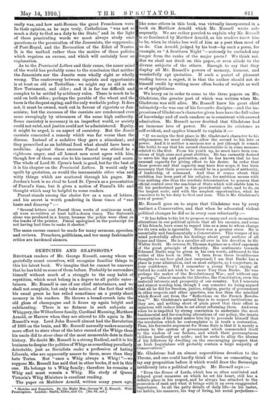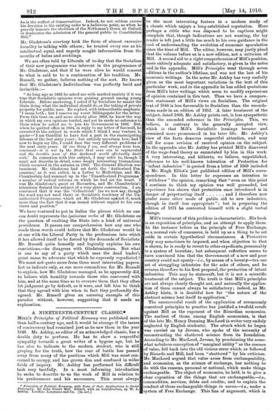SKETCHES AND SNAPSHOTS.*
REGULAR readers of Mr. George Russell, among whom we gratefully count ourselves, will recognise familiar things in this his latest book. We imagine that he cannot be unaware that he has told us some of them before. Probably he surrenders himself without much of a, struggle to the easy habit of repetition, which must belong in a degree to all public enter- tainers. Mr. Russell is one of °tmr chief entertainers, and we shall not complain, but only take notice, of the fact that with his usual grace he has relied sometimes on a pretty short memory in his readers. He throws a bread-crumb into the old glass of champagne and it fizzes up again bright and exhilarating. There is no flatness in such subjects as Whiggery, the Wilberforce family, Cardinal Manning, Matthew Arnold, or Harrow when they are stirred to life again in Mr. Russell's way. Lord John Russell almost had the Revolution of 1688 on the brain, and Mr. Russell normally makes scarcely more effort to steer clear of the later record of the Whigs than his uncle did to steer clear of the most memorable date in their history. No doubt Mr. Russell is a strong Radical, and it is his business to despise the politics of Whigs as something peculiarly detestable, just as Socialists make a profession of hating Liberals, who are apparently nearer to them, more than they hate Tories. But "once a Whig always a Whig! "—we suppose Mr. Russell has said that in other books, if not in this one. He belongs to a Whig family; therefore he remains a Whig and must remain a Whig. His study of Queen Victoria's Whig Ministers is excellent reading.
The paper on Matthew Arnold, written many years ago,
' Sketches and Snapshots. By the Right Hon. George W. E. Russell. With Frontispiece. London : Smith, Elder, and Co. [10s. 6d. not.]
like some others in this book, was virtually incorporated in a book on Matthew Arnold which Mr. Russell wrote sub- sequently. We are rather puzzled to explain why Mr. Russell is so fascinated by Matthew Arnold, as his readers know him to be, when he thinks less well of him as a poet than most of us do. Can Arnold, judged by his best—by such a poem, for example, as "A Southern Night "—seriously be excluded any longer from the ranks of the major poets ? We think not. But we shall not dwell on this paper, or even allude to the diverse subjects of the others. Enough to say that they display all Mr. Russell's powers of memory, humour, and wonderfully apt quotation. If such a parcel of pleasant reading leaves a regret, it is that the author should not do himself credit by writing more often books of weight as well as of sprightliness.
We hurry on in order to come to the three papers on Mr. Gladstone, the greater part of which was written when Mr. Gladstone was still alive. Mr. Russell knew his great chief intimately—he was one of his favourite disciples—and the im- pressions of Gladstone's character given here have the full value of knowledge and of such candour as is consistent with avowed admiration. Mr. Russell never doubted that Gladstone had an immense love of power. He assumes its existence as self-evident, and applies himself to explain it :—
" If we assign the first place in Mr. Gladstone's character to his religiousness, we must certainly allow the second to his love ot power. And it is neither a sarcasm nor a jest (though it sounds like both) to say that his second characteristic is in some measure elated to the first. From his youth up, he must have been con- scious of high aims and great abilities. He has earnestly desired to serve his day and generation, and he has known that he has unusual capacity for giving effect to his desire. In order that hose powers and that capacity may have free scope, it has been necessary that their possessor should be in a position of authority, of leadership, of command. And thus it comes about that ambition has been part of his religion ; for ambition means with him nothing else than the resolute determination to possess that official control over the machine of State which will enable him to fill his predestined part in the providential order, and to do, on he largest scale, and with the amplest opportunities, what he conceives to be his duty to God and man. This is Mr. Gladstone's love of power."
Mr. Russell goes on to argue that Gladstone was by every instinct a Conservative, and that when he advocated violent political changes he did so in every case reluctantly :— "It has fallen to his lot to propose so many and such momentous alterations in our political system that all his enemies, and some of his friends, have come to regard him as a man to whom change or its own sake is agreeable. Never was a greater error. He is essentially and fundamentally a Conservative. This temper of his mind powerfully affects his feelings about great authors of all types and times. He is a cavalier all over in his devotion to Sir Walter Scott. He reveres St. Thomas Aquinas as a chief exponent of the great principle of Authority. His sentiments towards Edmund Burke may be given in his own words, addressed to the writer of this book in 1884. 'I turn from these troublesome thoughts to say how glad (not surprised) I am that Burke has a. place in your admiration, and on most subjects, as I conjecture, in your confidence. Yet I remember a youny Tory's saying at Oxford he could not wish to be more Tory than Burke. He was perhaps the maker of the Revolutionary War; and without any "perhaps," almost unmade the liberties, the Constitution, even the material interests and prosperity of our country. Yet I venerate and almost worship him, though I can conceive its being argued that all he did for freedom, justice, religion, purity of government in other respects and other quarters, was less than the mischief which flowed out from the "Reflections on the French Revolu- tion." Mr. Gladstone's natural bias is to respect institutions as they are, and nothing short of plain proof that their effect is injurious will induce him to set about reforming them. And even when he is impelled by strong conviction to undertake the most fundamental and far-reaching alterations of our policy, the innate conservatism of his mind makes him try to persuade himself that the revolution which he contemplates is in truth a restoration. Thus, his favourite argument for Home Rule is that it is merely a return to the system of government which commended itself to the wisdom of our fathers, and which their presumptuous children heedlessly set aside ; and he seeks to allay the alarms of his followers by dwelling on the encouraging prospect that an Irish Legislature will probably contain a large majority of Conservatives."
Mr. Gladstone had an almost superstitious devotion to the Throne, and one could hardly think of him as consenting to lay any proposition before it which would draw the Sovereign invidiously into a political struggle. Mr. Russell says :— "Even the House of Lords, which has so often mutilated and delayed great measures on which he set his heart, still has a definite place in his respect, and he always has attached to the possession of rank and what it brings with it an even exaggerated importance. In all the petty details of daily life—in his tastes, his habits, his manners, his way of living, his social prejudices—. he is the stiffest of Conservatives. Indeed, he not seldom carries his devotion to the existing order to a ludicrous point, as when he gravely laments the abolition of the Nobleman's Gown at Oxford, or deprecates the admission of the general public to Constitution Hill."
Mr. Gladstone's courtesy took the form of almost excessive humility in talking with others; he treated every one as his intellectual equal, and eagerly sought information from the mouths of babes and sucklings.
We are often told by Liberals of to-day that the Socialism of their new programme was inherent in the programmes of Mr. Gladstone, and that if he were alive he would consent to what is said to be a continuation of his tradition. Mr. Russell, we gather, believes nothing of the sort. He knows that Mr. Gladstone's Individualism was perfectly lucid and invincible :—
" As long ago as 1885 he asked me with marked anxiety if it was true that Socialistic opinions were gaining ground among young Liberals. Before answering, I asked if by Socialism he meant the State doing what the individual should do, or the taking of private property for public uses. He replied, with indescribable emphasis : 6I mean both ; but I reserve my worst Billingsgate for the latter.' Prom this time on, and more clearly after 1889, he knew the way in which my own opinions tended, and yet he made no reference to them when he asked me to join his Government in 1892. But, when he quitted office in 1894, in reply to my letter of farewell, he reverted to the subject in words which I think I may venture to quote-61 am thankful to have had a part in the emancipating labours of the last sixty years ; but entirely uncertain how, had I now to begin my life, I could face the very different problems of the next sixty years. Of one thing I am, and always have been, convinced—it is not by the State that man can be regenerated and the terrible woes of this darkened world effectually dealt with.' In connexion with this subject, I may refer to, though I must not describe in detail, some deeply interesting transactions which occurred in the autumn in 1885. The General Election was imminent. Mr. Gladstone had set forth the 'Authorized Pro- gramme,' as it was called, in a Letter to Midlothian, and Mr. Chamberlain had summed up in the 'Unauthorized Programme' a number of radical reforms on which he had set his heart. I was Mr. Gladstone's guest at Hawarden, and Mr. Chamberlain's intentions formed the subject of a very grave conversation. I am convinced that it was the 'Collectivist' (as we now say, though the word was not used then) or Socialistic tendency of the Un- authorized Programme which set Mr. Gladstone against it, much more than the fact that it was issued without regard to his own views and position."
We have ventured to put in italics the phrase which no one
can doubt represents the ipsissima verba of Mr. Gladstone on the question of exalting the State into a kind of universal providence. It passes our comprehension how any one who reads those words could believe that Mr. Gladstone would be at one with the Liberal Party in the professions into which it has allowed itself to be forced by the demands of Socialists. Mr. Russell quite honestly and logically explains his own convictions,—he disagrees with Gladstonianism. But what is one to say of a party which uses the dead leader's great name to advocate that which he expressly repudiated P We must not quote more from these most interesting papers. Let us indicate only, as one more conundrum for Mr. Russell to explain, how Mr. Gladstone managed, as he apparently did, to behave with humility towards those who conversed with him, and at the same time so to overawe them that they often let judgment go by default, as it were, and left him to think that they agreed with him when in fact they profoundly dis- agreed. Mr. Russell gives an amusing example of this paradox without, however, suggesting that it needs an explanation.







































 Previous page
Previous page